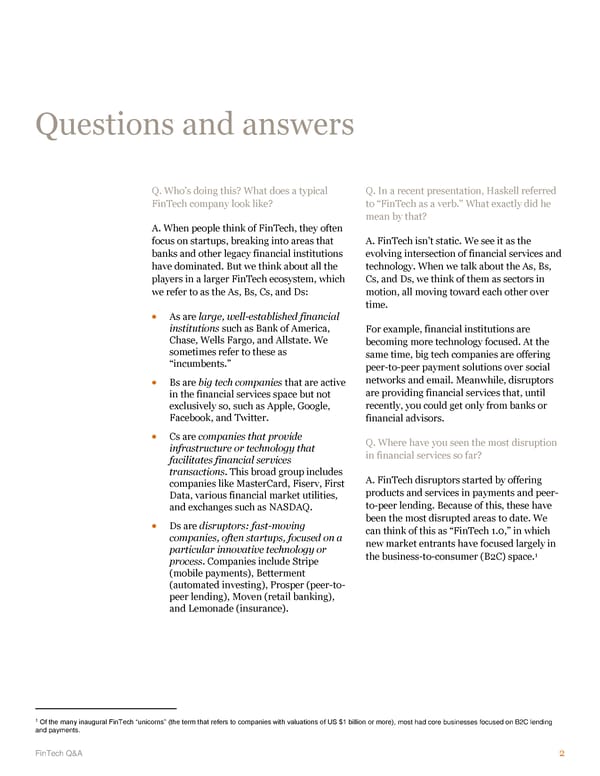Questions and answers Q. Who’s doing this? What does a typical Q. In a recent presentation, Haskell referred FinTech company look like? to “FinTech as a verb.” What exactly did he mean by that? A. When people think of FinTech, they often focus on startups, breaking into areas that A. FinTech isn’t static. We see it as the banks and other legacy financial institutions evolving intersection of financial services and have dominated. But we think about all the technology. When we talk about the As, Bs, players in a larger FinTech ecosystem, which Cs, and Ds, we think of them as sectors in we refer to as the As, Bs, Cs, and Ds: motion, all moving toward each other over time. As are large, well-established financial institutions such as Bank of America, For example, financial institutions are Chase, Wells Fargo, and Allstate. We becoming more technology focused. At the sometimes refer to these as same time, big tech companies are offering “incumbents.” peer-to-peer payment solutions over social Bs are big tech companies that are active networks and email. Meanwhile, disruptors in the financial services space but not are providing financial services that, until exclusively so, such as Apple, Google, recently, you could get only from banks or Facebook, and Twitter. financial advisors. Cs are companies that provide Q. Where have you seen the most disruption infrastructure or technology that in financial services so far? facilitates financial services transactions. This broad group includes A. FinTech disruptors started by offering companies like MasterCard, Fiserv, First products and services in payments and peer- Data, various financial market utilities, and exchanges such as NASDAQ. to-peer lending. Because of this, these have Ds are disruptors: fast-moving been the most disrupted areas to date. We companies, often startups, focused on a can think of this as “FinTech 1.0,” in which particular innovative technology or new market entrants have focused largely in 1 process. Companies include Stripe the business-to-consumer (B2C) space. (mobile payments), Betterment (automated investing), Prosper (peer-to- peer lending), Moven (retail banking), and Lemonade (insurance). 1 Of the many inaugural FinTech “unicorns” (the term that refers to companies with valuations of US $1 billion or more), most had core businesses focused on B2C lending and payments. FinTech Q&A 2
 Questions and Answers FinTech Page 2 Page 4
Questions and Answers FinTech Page 2 Page 4